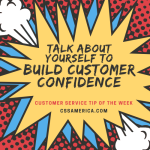
I’ve often used the phrase “Customer Service Stars” to address people who are outstanding at customer service. And while I would never tell anyone not to continually improve themselves (sorry for the double negative…), I don’t think that people should have to be great at everything to be great. In fact, it’s often counterproductive to try to be great at everything you do.
Think about your product, service, and process knowledge. To have complete knowledge of all those aspects of your organization requires a tremendous amount of study and continuous review of all changes that continually happen in most organizations.
Think about having the skills that you need to handle every customer interaction – control over your body language, tone, and words. You’d need the quick ability to change direction for every call, every interaction, every meeting to perfectly address the uniqueness of every individual and their situation.
How many of us are perfect at business writing – constructing e-mails with the tone and content that maximizes the perception of the reader that we care while simultaneously giving them the best answer?
We could go to key customer service principles – responsiveness, respect, collaboration, empathy, active listening, organizational skills, etc. Who’s perfect at those?
The point is that to be great at all these and the many other things required of someone in customer service, it’s virtually impossible, and I don’t want you to feel bad about your shortcomings. Customer service is my business – literally – and I fall far short in many of these points; I just keep working on them.
So keep working on your shortcomings, but find out where you’re already great!
You have that infectious attitude. You’re very organized, and that helps you to be productive and responsive. You’re highly empathetic and/or a great listener. You’re an incredibly self-aware person, so you know how you come across with your body language, tone, and words.
While you should continuously work to be good at all the qualities and skills of Customer Service Stars, make sure you know where you are already a Star (or REALLY close), and make that trait your calling card. Make that aspect of who you are be the aspect that separates you from others. Make that characteristic of who you are or how you act help you to stand out today.
Stand out to others by finding that one thing where you can be great.
Signup for FREE Tips! Contact Us More Resources for You Visit Our Home Page























